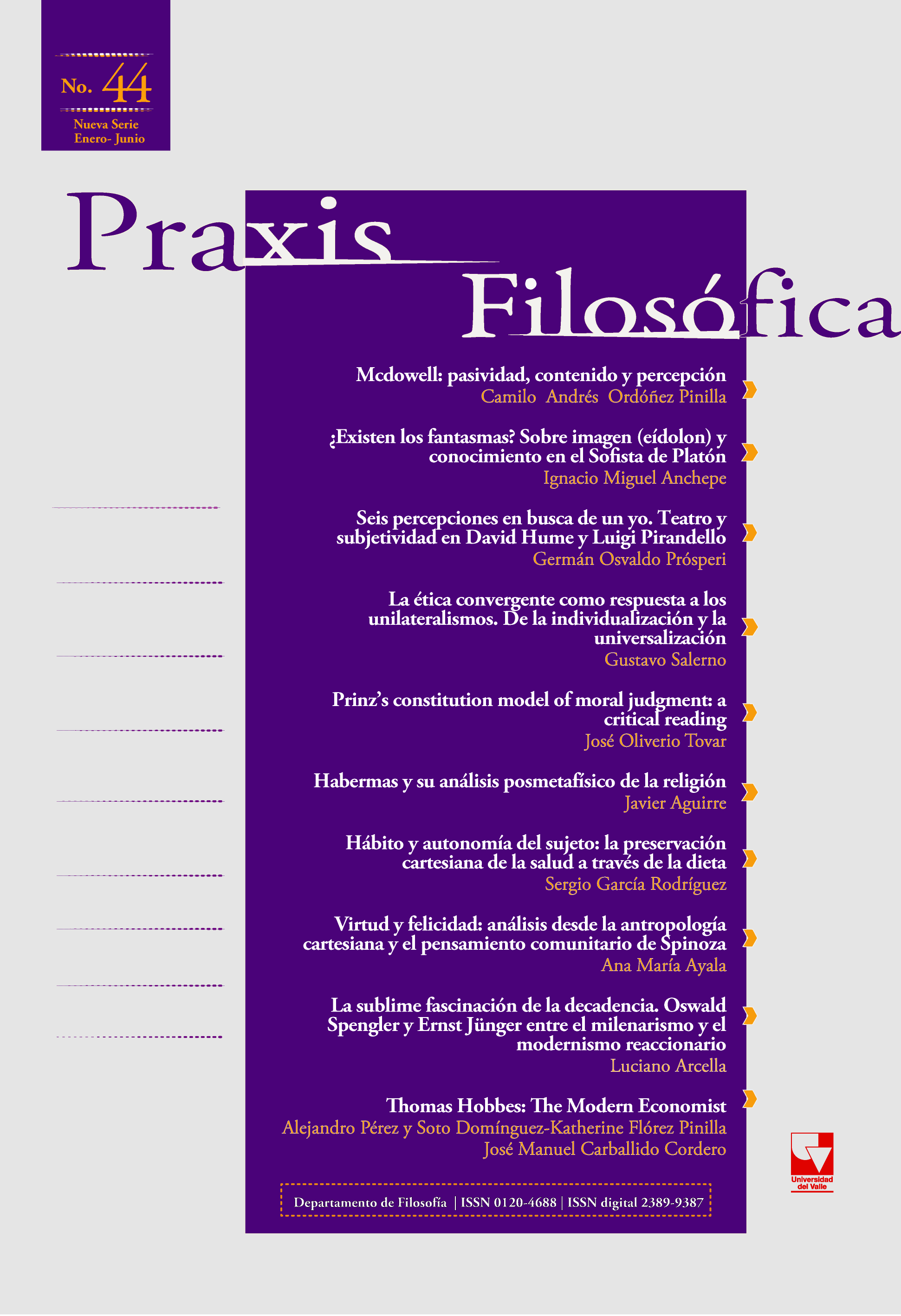Prinz’s constitution model of moral judgment: a critical reading
Contenido principal del artículo
The purpose of this paper is to critically review Prinz’s constitution model. According to commonly suggested models, moral judgment is the result of specific cognitive processes that are intuitive, emotional or rational. According to Prinz, sentimentalist views argue that such judgments are caused by emotions. In contrast, he argues that moral judgment is constituted, not caused, by them. I will expose Prinz’s argument to support his proposal and outline some inconsistencies of it.
- Sentiment
- sentimiento
- Emotion
- emoción
- Moral Judgment
- juicio moral
- Constitution Model
- modelo de constitución
- Cognitive Processes
Adolphs, Ralph, Tranel, Daniel, and Damasio, Antonio. R. 2003. “Dissociable neural systems for recognizing emotions.” Brain and Cognition, 52:1, 61–69.
Blair, James. 1995. “A cognitive developmental approach to morality: investigating the psychopath.” Cognition, 57:1, 1–29. Reprinted in Thomas, Nadelhoffer, Eddie, Nahmias, and Shaun Nichols, editors. 2010. Moral Psychology: Historical and Contemporary Readings (pp. 48–63). Maiden, MA: Wiley-Blackwell.
Ciaramelli, Elisa, Muccioli, Michela, Làdavas, Elisabetta and di Pellegrino, Giuseppe. 2007. Selective deficit in personal moral judgment following damage to ventromedial prefrontal cortex. Social Cognitive and Affective Neuroscience, 2:2, 84–92.
Cushman, Fiery and Young, Liane. 2011. Patterns of moral judgment derive from nonmoral psychological representations. Cognitive Science, 35:6, 1052-1075.
Damasio, Antonio. 1996. The somatic marker hypothesis and the possible functions of the prefrontal cortex. Philosophical Transactions of the Royal Society London Series Biological Science, 351:1346, 1413-1420.
Damasio, Antonio. 1994. Descartes' error: emotion, reason, and the human brain. New York: Putnam.
Davidson, Richard. 2003. Seven sins in the study of emotion: Correctives from affective neuroscience. Brain and Cognition, 52:129–132.
Davidson, Richard. 2000. Cognitive neuroscience needs affective neuroscience (and vice verse). Brain and Cognition, 42:89–92.
Ditto, Peter and Liu, Brittany. 2012. Deontological Dissonance and the Consequentialist Crutch. In Mikulincer, M., & Shaver, P. (Eds.), The Social Psychology of Morality: Exploring the Causes of Good and Evil (pp. 51-71). Washington, D.C.: American Psychological Association.
Doidge, Norman. 2007. The Brain That Changes Itself: Stories of Personal Triumph from the frontiers of brain science. New York: Viking.
Dolan, Ray. 2002. “Emotion, cognition, and behavior”. Science, 298:1191–1194.
Greene, Joshua, Nystrom, Leigh, Engell, Andrew, Darley, John, Cohen, Jonathan. 2004. “The neural bases of cognitive conflict and control in moral judgment”. Neuron, 44: 389-400.
Haidt, Jonathan. 2001. “The emotional dog and its rational tail: A social intuitionist approach to moral judgment”. Psychological Review, 108:814–834.
Hauser, Marc. 2006. Moral Minds: how nature designed our universal sense of right and wrong. New York: Harper Collins Publishers.
Heekeren, Hauke, Wartengurger, Isabel, Prehn, Kristin, Schwintowski, Hans-Peter, Arno Villringer. 2005. “Influence of bodily harm on neural correlates of
semantic and moral decision-making”. NeuroImage, 24: 887–897.
Koenigs, Michael, Young, Liane, Adolphs, Ralph, Tranel, Daniel, Cushman, Fiery, Hauser, Marc and Damasio, Antonio. (2007). “Damage to the prefrontal cortex increases utilitarian moral judgements”. Nature, 446: (7138), 908–911.
Moll, Jorge, de Oliveira-Souza, Ricardo, Bramati, Ivanei and Grafman, Jordan. 2002. “Functional networks in emotional moral and nonmoral social judgments”. Neuroimage,16: 696–703.
Nichols, Shaun. 2004. Sentimental Rules: On the Natural Foundations of Moral Judgment. Oxford: Oxford University Press.
Pessoa, Luiz. 2008. “On the relationship between emotion and cognition”. Nature Reviews Neuroscience, 9: 148-158.
Pessoa, Luiz and Adolphs, Ralph. 2010. “Emotion processing and the amygdala: from a ‘low road’ to ‘many roads’ of evaluating biological significance”. Nature Reviews Neuroscience, 11: 773-783.
Prehn, Kristin and Heekeren, Hauke. 2009. Moral Judgment and the Brain: A Functional Approach to the Question of Emotion and Cognition in Moral Judgment Integrating Psychology, Neuroscience and Evolutionary Biology. In Jan Verplaetse, Jelle De Schrijver, Sven Vanneste, Johan Braeckman, editors. The Moral Brain: Essays on the Evolutionary and Neuroscientific Aspects of Morality (pp. 129 – 154). Dordrecht, The Netherlands: Springer.
Prehn, Kristin, Wartenburger, Isabell, Mériau, Katja, Scheibe, Christina, Goodenough, Oliver R, Villringer, Arno, van der Meer, Elke; Heekeren, Hauke. 2008. “Individual differences in moral judgment competence influence neural correlates of socio-normative judgments”. Social Cognitive & Affective Neuroscience, 3:1, 33-46.
Prinz, Jesse. 2008. Is morality innate? In W. Sinnott-Armstrong (Ed.), The evolution of morality (Vol. 1, pp. 367–406). Cambridge: MIT Press.
Prinz, Jesse. 2007. The emotional construction of morals. New York: Oxford University Press.
Prinz, Jesse. 2004a. Gut Reactions: A perceptual theory of emotion. New York: Oxford
University Press.
Prinz, Jesse. 2004b. Which emotions are basic? In D. Evans and P. Cruse (Eds.), Emotion, evolution, and rationality (pp. 69–87). New York: Oxford University Press. Traducido al español por Tovar, José. 2010. “¿Cuáles son las emociones básicas?”. Cuadernos de Crítica, México: UNAM, Instituto de Investigaciones Filosóficas, No. 55.
Salzman, Daniel, and Fusi, Stefano. 2010. “Emotion, cognition, and mental state representation in amygdala and prefrontal cortex”. Annu Rev Neurosci, 33:173-202.
Tovar, José, and Ostrosky, Feggy. 2013. Mentes Criminales ¿Eligen el Mal? Estudios de Cómo se Genera el Juicio Moral. México: Manual Moderno.
Wheatley, Thalia, and Haidt, Jonathan. 2005. “Hypnotic disgust makes moral judgments more severe”. American Psychological Society, 16:10, 780-784.
Descargas
Aceptado 2017-04-04
Publicado 2017-01-15

Esta obra está bajo una licencia internacional Creative Commons Atribución-NoComercial-CompartirIgual 4.0.
De acuerdo con nuestra política (Licencia Creative Commons CC BY-NC-SA 4.0) los artículos presentados y sometidos al proceso editorial en la revista Praxis Filosófica no tienen costo alguno para sus autores ni retribuciones económicas para la revista. El artículo de carácter inédito, producto de investigación o de algún proyecto que se presente a Praxis Filosófica, no podrá estar sometido a otro proceso de publicación durante el proceso que se lleve en nuestra revista.





